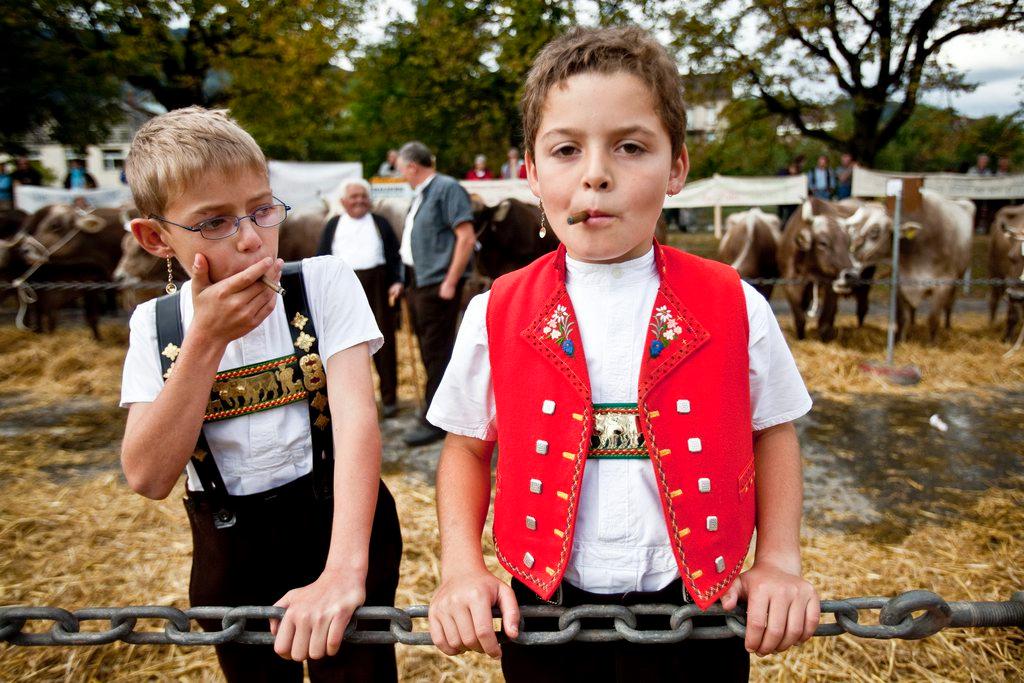Defiance of a cigar veteran

Stand in Zürich's Paradeplatz, where trams rattle past the head offices of Switzerland's biggest banks, and you catch a distinctive whiff in the Alpine air: tobacco smoke.
Smartly-dressed bankers light small cigarillos between meetings. A boutique window displays fat Honduran cigars.
Switzerland is not just about conservative banks or mountain scenery. It is a leader in smoking pricey cigars. Spending per head on cigars is the highest in the world, according to Euromonitor (Spain is ahead in the number consumed). Expensive cigars go “hand in hand” with Switzerland’s upmarket image, the research firm noted recently. Cigar smoke fits with the country’s blend of rightwing and liberal politics favouring personal freedoms, particularly for rich businessmen.
Emblematic of Swiss cigar culture is Heinrich Villiger, 85-year-old owner of the Villiger Söhne cigar company, and an importer of Cuban cigars into Germany, Poland and Austria as well as Switzerland. He has spent a lifetime promoting rolled tobacco leaf products. Nicotine, he says, calms his mind. In two hours spent with the Financial Times, he happily chomps through three cigars.
War on the industry
Yet Mr Villiger is anything but relaxed about the industry’s prospects.
The brother of a former president of Switzerland, he is grabbing headlines in the country for opposing domestic plans to tighten current restrictions on the tobacco industry. A bigger target is the World Health Organisation in Geneva.

More
Financial Times
External link“The WHO has declared war against our industry – they want to kill us,” Mr Villiger says. Margaret Chan, WHO director-general, “has said tobacco is doing so much harm, this industry must be destroyed . . . She has said ‘we – the WHO – want to kill this industry by 2040’.”
Even in cigar-friendly Switzerland, his fighting spirit is striking. There is no confirmation that Ms Chan used those words and the WHO denies it has any such target for abolishing tobacco; its objective is “to alleviate the suffering and death caused by tobacco-related diseases”. At his stage in life, however, Mr Villiger has little to lose by defying politically-correct wisdom. Would he like to meet Ms Chan? “No, no, I would not like to meet her,” he laughs. “She’s a terrible woman.”
Family business
The Villiger family’s cigar company – Europe’s fifth-biggest by market share – was founded by his grandfather in 1888, producing Swiss Stumpen, or cheroots, in Pfeffikon, near Lucerne. Its overseas expansion began in 1910, when it set up a manufacturing subsidiary just over the Swiss border in Waldshut-Tiengen, Germany, to avoid import duties.
Mr Villiger visited Cuba before and after the 1950s revolution, later establishing joint ventures to import its cigars. Half his 1,500 workforce is in Indonesia, where it is cheaper to hand work tobacco. Mr Villiger lives on the other side of the Rhine from Waldshut, in the country of his birth. “I’m a real Swiss. I’m not going to live in Germany.”
His hair and neat beard are snow white but Mr Villiger is smiley and sprightly – proof that a life of tobacco does not always mean an early death. He does not dispute that tobacco is dangerous – “I prefer to say ‘it is not good'” – but argues that cigars are healthier than cigarettes if smoke is not inhaled. The WHO dismisses such arguments as creating a false “illusion of safety”.
“We have the pleasure, the taste, in the mouth, not in the lungs,” he says. Mr Villiger recommends smoking only two-thirds of a cigar because the stump acts as a filter. “For us, it would be better if they only smoked half,” he laughs.
Cutting back
No matter how defiantly he smokes, however, Mr Villiger cannot escape economics. European cigar sales are falling. Turnover at the Villiger family company has stabilised at about €200 million (CHF217 million) a year. Switzerland accounts for only about 10 per cent of its sales by units.
“We have a new generation of young managers [in Switzerland] who come out of the office at 5pm or 6pm and sit in a café and smoke a cigar, but this is a small minority. They are the same people who buy a good watch and an expensive glass of wine.” And cigars are an overwhelmingly male taste. Women “may smoke a small cigarillo but it is not elegant”, Mr Villiger says.
Late on a Friday afternoon, with grey winter skies outside, Mr Villiger cuts a lonely figure in the Waldshut factory established by his grandmother. Most employees have left for the day; a few packaging machines clatter away. He starts late, he says, often staying until 10pm, lighting a cigar at 8pm or 9pm.
Six years ago he had a heart attack. “When I arrived at the hospital, they didn’t know who I was,” he recalls. “The first question was: ‘Are you a smoker?’ I said ‘Yes’. They asked: ‘How many a day?’ I said 10. So my cardiologist said I should cut back. I’m smoking three or four a day. Luckily, I have not had further problems.”
Mr Villiger is “disappointed” the Swiss government is heeding WHO advice and tightening tobacco legislation. Politicians, he says, are only interested in re-election and “the tobacco sector is not an important industry”.
His younger brother Kaspar was defence and finance minister in the 1990s, and served two years as president. There are few prominent Swiss cigar smokers. An exception is Nick Hayek, chief executive of Swatch, the Swiss watch company, who chomps away on cigars from the Dominican Republic. Like Mr Villiger, he finds the Cuban variety too strong.
‘Sooner or later’
Mr Villiger tried diversifying. A keen cyclist, who still pedals a few hours each week, he bought a Swiss bicycle factory 20 years ago, but it burnt down and he had inadequate insurance. Then, after the collapse of the Berlin Wall, he bought Diamant, the East German bicycle company. “I really believed in bikes,” he says. But he failed to turn the business around. “The banks said: ‘Mr Villiger, think it over: all the money you make with cigars, you lose with your bike business. It makes no sense.'” In 2002 he sold Diamant to Trek, the US bicycle company.
Mr Villiger hopes the company’s family ownership will continue. None of his four children or nine grandchildren is interested in joining the business, so he is looking for an external chief executive. It is a sentimental attachment.
In 65 years in the business, he says he knows of only one company employee who died of lung cancer. “He was inhaling cigar smoke.” The WHO “says there are millions of deaths but I don’t know who counts them . . . We all die sooner or later.”
He draws deeply on his Brazilian San’Doro cigar resting between the second and third fingers of his right hand. “I’m 85. I’m very aware that sooner or later it will come to the end. I smoke four cigars a day . . . Will I count as a smoker’s death?”
Copyright The Financial Times Limited 2015

In compliance with the JTI standards
More: SWI swissinfo.ch certified by the Journalism Trust Initiative











You can find an overview of ongoing debates with our journalists here . Please join us!
If you want to start a conversation about a topic raised in this article or want to report factual errors, email us at english@swissinfo.ch.